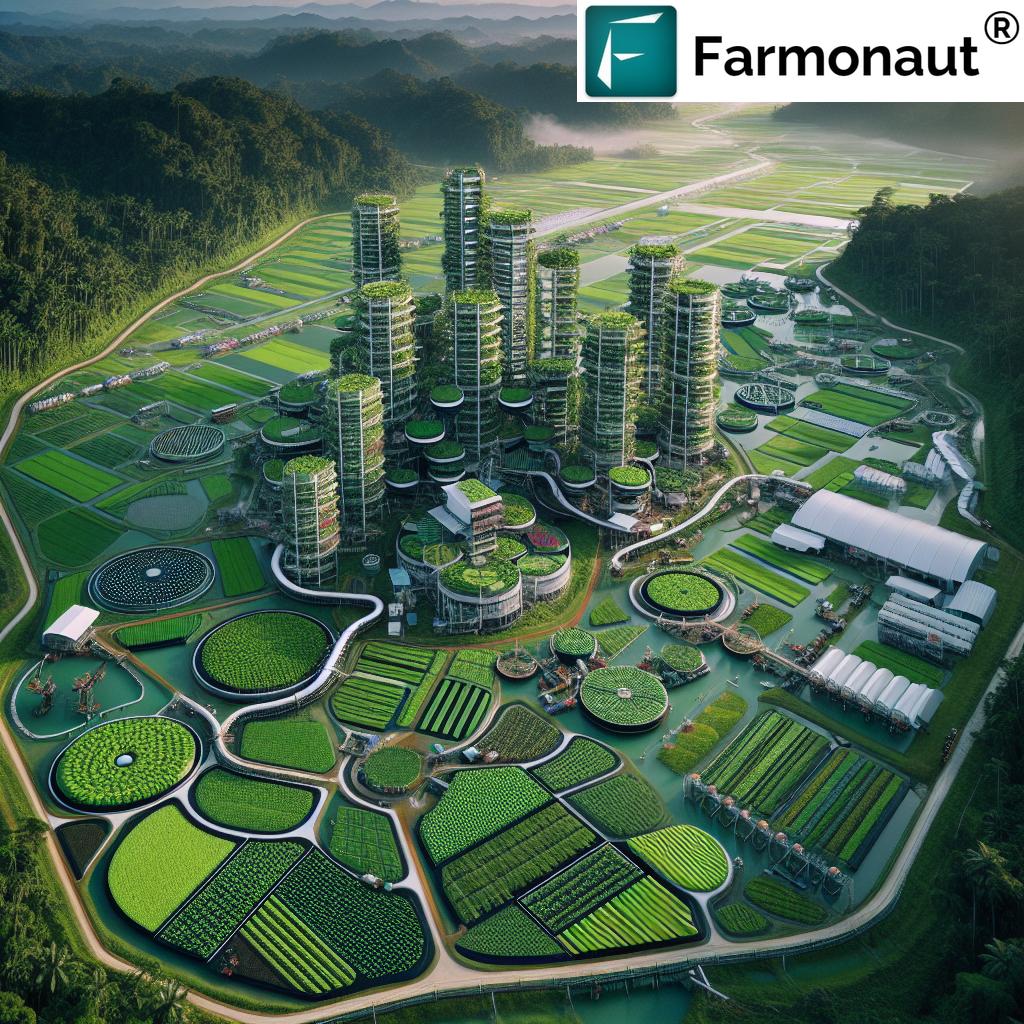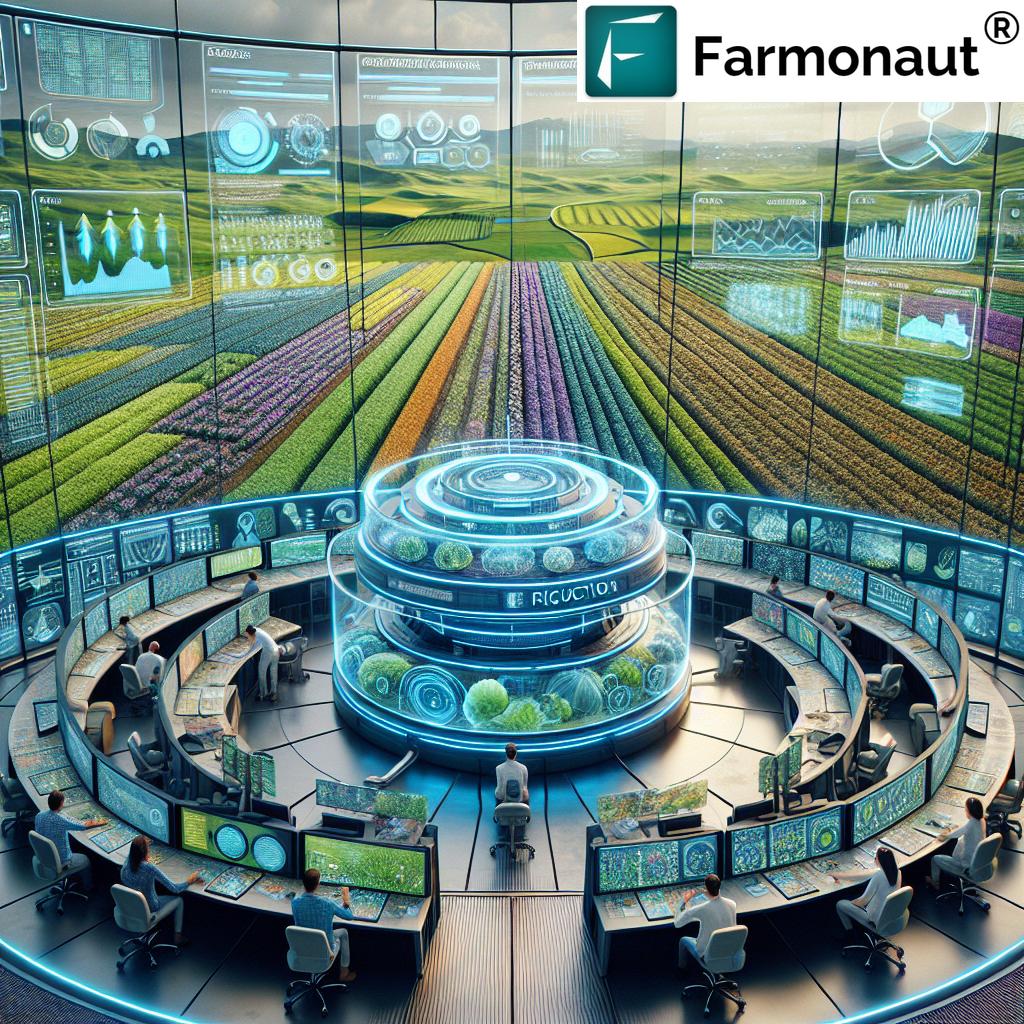Boosting Malaysia’s Food Security: How Farmonaut’s Sustainable Agriculture Technology Transforms Local Production
“Malaysia’s Ministry of Agriculture plans to expand Permanent Food Production Park areas nationwide, aiming to reduce import reliance.”
In an era where food security is becoming increasingly crucial, Malaysia is taking significant strides to revolutionize its agricultural landscape. As we delve into the transformative power of sustainable agriculture technology, we’ll explore how innovative solutions are reshaping the nation’s approach to food production and security. At the forefront of this agricultural revolution is Farmonaut, a pioneering agritech company that’s making waves with its cutting-edge satellite-based farm management solutions.
The Challenge: Malaysia’s Food Security Landscape
Malaysia, like many developing nations, faces the dual challenge of meeting growing food needs while reducing its dependence on imported agricultural products. The country’s rapid urbanization and population growth have put immense pressure on its agricultural sector to increase food production sustainably. To address these challenges, the Malaysian government, particularly the Department of Agriculture, has been implementing various initiatives to boost domestic food supply and ensure long-term food security.
Innovative Solutions: Permanent Food Production Parks
One of the most promising initiatives is the expansion of Permanent Food Production Park (TKPM) areas across the nation. This project, spearheaded by the Ministry of Agriculture and Food Security, aims to create permanent production zones for sustainable, quality, and safe food consumption. By designating specific areas for agricultural development, Malaysia is taking a strategic approach to guarantee agricultural production and reduce reliance on imports.
- Increased land allocation for agriculture
- Focus on high-value crops
- Implementation of modern farming techniques
- Promotion of agricultural innovation
These efforts are not just about increasing farm income; they’re designed to meet national food security goals and create a more resilient agricultural sector.
The Role of Sustainable Agriculture Technology
At the heart of Malaysia’s agricultural transformation is the adoption of sustainable agriculture technology. This is where Farmonaut’s expertise comes into play. By leveraging advanced satellite-based farm management solutions, Farmonaut is helping to revolutionize how Malaysian farmers approach crop cultivation and resource management.
Key Features of Farmonaut’s Technology:
- Satellite-Based Crop Health Monitoring: Real-time insights into vegetation health, soil moisture levels, and critical metrics.
- Jeevn AI Advisory System: Personalized farm advisory tool delivering real-time insights and expert crop management strategies.
- Blockchain-Based Product Traceability: Enhancing transparency and security in agricultural supply chains.
- Fleet and Resource Management: Optimizing logistics and reducing operational costs for agribusinesses.
- Carbon Footprinting: Helping businesses monitor and reduce their environmental impact.
These technologies are accessible through Farmonaut’s  ,
,  , and
, and  , making it easy for farmers and agribusinesses to leverage these tools from anywhere.
, making it easy for farmers and agribusinesses to leverage these tools from anywhere.

Transforming Local Production: The Impact of Sustainable Agriculture Technology
The implementation of sustainable agriculture technology is having a profound impact on Malaysia’s agricultural sector. Let’s explore how these innovations are changing the landscape:
1. Increased Crop Yields
By utilizing Farmonaut’s satellite-based crop health monitoring, farmers can identify issues early and take preventive measures. This results in:
- Higher crop yields per hectare
- Reduced crop losses due to pests and diseases
- Optimized use of fertilizers and pesticides
2. Water Conservation
Farmonaut’s technology provides real-time data on soil moisture levels, enabling farmers to:
- Implement precision irrigation techniques
- Reduce water wastage
- Adapt to changing weather patterns
3. Sustainable Land Management
The AI-driven advisory system helps in:
- Implementing crop rotation strategies
- Improving soil health
- Reducing environmental impact
“Modern farming techniques in Malaysia are encouraging youth and entrepreneurs to engage in commercial agriculture, boosting domestic food production.”
4. Empowering Youth and Entrepreneurs
The integration of technology in agriculture is making the sector more attractive to younger generations. This is crucial for:
- Ensuring the continuity of agricultural practices
- Bringing fresh ideas and innovation to the field
- Creating new job opportunities in rural areas
Comparative Analysis: Traditional vs. Sustainable Agriculture
To better understand the impact of sustainable agriculture technology in Malaysia, let’s compare it with traditional agricultural practices:
| Aspects | Traditional Agriculture | Sustainable Agriculture Technology |
|---|---|---|
| Crop Yield (estimated tons/hectare) | 3-5 | 6-8 |
| Water Usage (estimated liters/hectare) | 8000-10000 | 5000-7000 |
| Pesticide Use (estimated kg/hectare) | 5-7 | 2-4 |
| Soil Health Impact | Moderate to High | Low to Moderate |
| Technology Integration | Low | High |
| Youth Engagement | Low | High |
| Food Security Contribution | Medium | High |
| Environmental Sustainability | Low | High |
| Economic Viability | Medium | High |
| Resilience to Climate Change | Low | Medium to High |
This comparison clearly illustrates the advantages of sustainable agriculture technology in addressing Malaysia’s food security challenges while promoting environmental sustainability and economic growth.
Farmonaut’s Contribution to Malaysia’s Agricultural Transformation
Farmonaut’s suite of tools is playing a pivotal role in Malaysia’s journey towards sustainable and efficient agriculture. Here’s how:
1. Precision Agriculture for All
By offering affordable satellite-based monitoring services, Farmonaut is democratizing access to precision agriculture. This means that even small-scale farmers in Malaysia can benefit from advanced technologies, leading to:
- More efficient resource use
- Higher productivity
- Reduced environmental impact
2. Data-Driven Decision Making
The Jeevn AI Advisory System provides Malaysian farmers with:
- Real-time crop health insights
- Weather forecasts tailored to specific locations
- Personalized recommendations for crop management
This empowers farmers to make informed decisions, optimizing their farming practices and increasing yields.

3. Enhancing Supply Chain Transparency
Farmonaut’s blockchain-based traceability solutions are particularly valuable for Malaysia’s agricultural sector, offering:
- Increased transparency in food supply chains
- Enhanced food safety measures
- Improved consumer trust in local produce
4. Supporting Sustainable Practices
With features like carbon footprint tracking, Farmonaut is helping Malaysian agribusinesses:
- Monitor and reduce their environmental impact
- Align with global sustainability standards
- Attract environmentally conscious consumers and investors
The Future of Agriculture in Malaysia
As Malaysia continues to invest in sustainable agriculture technology, we can expect to see:
- Increased domestic food production
- Reduced dependence on imported agricultural products
- More resilient and sustainable farming practices
- Greater involvement of youth in agriculture
- Enhanced food security for the nation
The integration of Farmonaut’s technologies with Malaysia’s agricultural initiatives is paving the way for a more secure and sustainable food future. By leveraging satellite data, AI, and blockchain, Malaysian farmers and agribusinesses are better equipped to face the challenges of climate change, population growth, and economic pressures.
Embracing Sustainable Agriculture Technology: A Call to Action
For Malaysian farmers, agribusinesses, and policymakers looking to leverage sustainable agriculture technology, Farmonaut offers a range of solutions accessible through its web and mobile applications. Here’s how you can get started:
- For Farmers: Explore Farmonaut’s crop monitoring and AI advisory services to optimize your farm’s productivity.
- For Agribusinesses: Implement Farmonaut’s fleet management and traceability solutions to enhance efficiency and transparency.
- For Policymakers: Consider integrating Farmonaut’s technologies into broader agricultural development programs to support sustainable farming practices nationwide.
To learn more about how Farmonaut can transform your agricultural practices, visit their website or download their mobile app:
For developers interested in integrating Farmonaut’s satellite and weather data into their own systems, check out the API and API Developer Docs.
Conclusion: A Sustainable Future for Malaysian Agriculture
The journey towards food security and sustainable agriculture in Malaysia is ongoing, but with the integration of innovative technologies like those offered by Farmonaut, the future looks promising. By embracing sustainable agriculture technology, Malaysia is not only addressing its immediate food security concerns but also laying the groundwork for a more resilient, productive, and environmentally friendly agricultural sector.
As we move forward, the collaboration between technology providers like Farmonaut, local farmers, agribusinesses, and government initiatives will be crucial in realizing the full potential of sustainable agriculture in Malaysia. Together, we can create a more food-secure future, where domestic production meets the nation’s growing needs while preserving the environment for generations to come.
Farmonaut Subscriptions
Frequently Asked Questions
1. How does Farmonaut’s technology contribute to food security in Malaysia?
Farmonaut’s satellite-based crop monitoring and AI advisory systems help Malaysian farmers optimize their crop yields, reduce resource wastage, and make data-driven decisions. This leads to increased food production and improved agricultural sustainability, directly contributing to the country’s food security efforts.
2. Can small-scale farmers in Malaysia benefit from Farmonaut’s solutions?
Yes, Farmonaut’s solutions are designed to be accessible and affordable for farmers of all scales. Small-scale farmers can use the mobile app to access valuable insights about their crops and receive personalized advice, helping them improve their productivity and profitability.
3. How does Farmonaut’s technology help in reducing water usage in agriculture?
Farmonaut’s satellite-based soil moisture monitoring provides farmers with real-time data on their fields’ water needs. This allows for precise irrigation scheduling, reducing water wastage and ensuring optimal water use efficiency in crop production.
4. What role does Farmonaut play in encouraging youth participation in agriculture?
By integrating modern technology into farming practices, Farmonaut makes agriculture more appealing to tech-savvy youth. The use of satellite imagery, AI, and mobile apps aligns with the digital skills of younger generations, encouraging their involvement in the agricultural sector.
5. How does Farmonaut’s blockchain technology enhance food traceability in Malaysia?
Farmonaut’s blockchain-based traceability solution allows for transparent tracking of agricultural products from farm to consumer. This enhances food safety, builds consumer trust, and helps Malaysian producers differentiate their products in both domestic and international markets.



